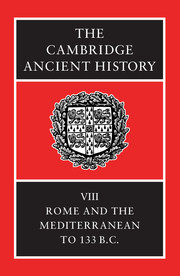Book contents
- Frontmatter
- Contents
- List of maps
- List of text-figures
- Preface
- 1 Sources
- 2 The Carthaginians in Spain
- 3 The Second Punic War
- 4 Rome and Greece to 205 B.C.
- 5 Roman expansion in the west
- 6 Roman government and politics, 200-134 B.C.
- 7 Rome and Italy in the second century B.C.
- 8 Rome against Philip and Antiochus
- 9 Rome, the fall of Macedon and the sack of Corinth
- 10 The Seleucids and their rivals
- 11 The Greeks of Bactria and India
- 12 Roman tradition and the Greek world
- 13 The transformation of Italy, 300 – 133 B.C. The evidence of archaeology
- Three Hellenistic Dynasties
- Genealogical Tables
- Chronological Table
- BIBLIOGRAPHY
- Index
- Map 11: Greece and Asia Minor
- Map 13: Asia Minor and Syria
- References
9 - Rome, the fall of Macedon and the sack of Corinth
Published online by Cambridge University Press: 28 March 2008
- Frontmatter
- Contents
- List of maps
- List of text-figures
- Preface
- 1 Sources
- 2 The Carthaginians in Spain
- 3 The Second Punic War
- 4 Rome and Greece to 205 B.C.
- 5 Roman expansion in the west
- 6 Roman government and politics, 200-134 B.C.
- 7 Rome and Italy in the second century B.C.
- 8 Rome against Philip and Antiochus
- 9 Rome, the fall of Macedon and the sack of Corinth
- 10 The Seleucids and their rivals
- 11 The Greeks of Bactria and India
- 12 Roman tradition and the Greek world
- 13 The transformation of Italy, 300 – 133 B.C. The evidence of archaeology
- Three Hellenistic Dynasties
- Genealogical Tables
- Chronological Table
- BIBLIOGRAPHY
- Index
- Map 11: Greece and Asia Minor
- Map 13: Asia Minor and Syria
- References
Summary
ROME, PHILIP AND THE GREEKS AFTER APAMEA
It is only with the defeat of Antiochus and the Peace of Apamea (188) that the nature of the Roman settlement of Greece can begin to be discerned. Roman troops did not leave Greece for two years after the Isthmian proclamation of 196, and it was two years after that that Antiochus sailed into Demetrias. Even in 196 the Aetolians had claimed that the Roman victory over Philip would bring the Greeks not liberation but only a change of master. This belief brought them to war. They lost and surrendered to the victors both their liberty and more money than their nation could afford. The Greeks had not believed their claim, and the Aetolians and their eastern ally were insufficient to the task. In a sense their claim was wrong. The Greeks found in Rome a master such as Philip had never come near to being, stronger and more deleterious.
Troubles began in Achaea and Boeotia very early on and, in both cases, have their roots in the 190s. In 192 Sparta had joined the Achaean League, not by unanimous agreement. Late in 189, with others in power, Sparta sought to secede. The Spartans invoked the Romans but received from them no clear support, and in spring 188 Philopoemen brought them back into the League. Some at Sparta, who disapproved of the Achaean settlement, complained to the Senate. This elicited a letter to the Achaeans from the consul of 187, M. Aemilius Lepidus, communicating the Roman judgement that the Spartan affair had not been correctly handled. No details were added, and the matter was not pressed.
- Type
- Chapter
- Information
- The Cambridge Ancient History , pp. 290 - 323Publisher: Cambridge University PressPrint publication year: 1989
References
- 39
- Cited by

